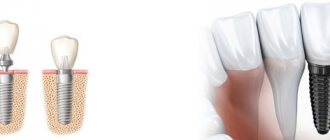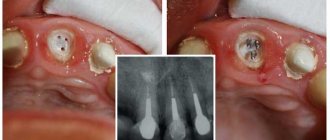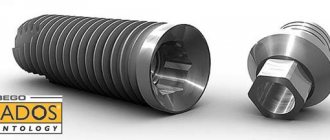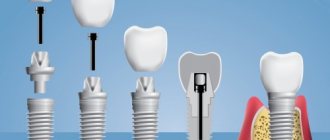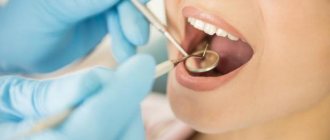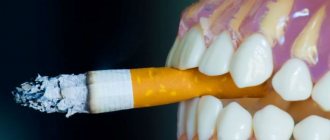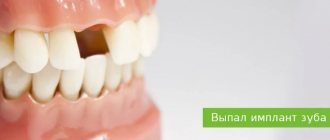Over the course of a month, serious hormonal changes occur in the female body.
General well-being and state of health largely depend on them. During menstrual bleeding, a woman often experiences severe discomfort, so some medical procedures and manipulations are contraindicated for her. Let's figure out whether it is possible to remove a tooth during menstruation? After all, this surgical operation is highly stressful and is not always easily tolerated by patients. At the Line of Smile dental clinic there is no clear policy not to operate on “these days.” But we always try to take into account the cyclical nature of women’s physiology, since surgery during menstruation can negatively affect further wound healing. Therefore, it is important for the client to be honest during the consultation with the doctor and not be embarrassed to ask to reschedule the planned operation. However, if an x-ray shows that there is an infectious focus, removal is carried out on an emergency basis, regardless of what day of the menstrual cycle we are talking about.
Why is it undesirable to have surgery during menstruation?
When planning an extraction, a highly qualified dentist always finds out what stage the woman is in her menstrual cycle. Why is he asking this? It's simple. The quality and composition of the blood directly determines the effectiveness of the anesthesia used and the rate of formation of a blood clot in the socket.
On menstrual days, blood clotting is significantly reduced. That's how it should be. Its composition also changes. Therefore, whenever possible, planned surgical intervention is postponed to “safer” days of the cycle.
Taking an X-ray
Many people consider the X-rays used to perform the procedure to be very harmful. Most prejudices are associated with the negative impact of x-rays on the menstrual cycle. Therefore, many women are afraid of this manipulation during menstruation.
In fact, all experiences are completely groundless. X-rays are directed exclusively to the area of the gum where the root of the diseased tooth is located. The woman’s body, in particular the pelvis, is reliably protected by a special coating. The specialist takes the picture instantly; no radiation can cause harm in such a short period of time. Therefore, no contraindications or features of the use of this type of diagnosis during the period of regulation have been discovered to this day.
Dental diagnoses in which periods are not a hindrance
If you doubt whether it is possible to remove a tooth during menstruation, contact your dentist. If the doctor deems it necessary, he will postpone the operation until later.
Indications for emergency intervention are:
- Severe inflammation, a purulent process that can provoke the development of an abscess, phlegmon, infection of the maxillary sinuses, osteomyelitis.
- A retracted (not fully erupted) wisdom tooth that is completely or partially hidden under the gum tissue/bone. It should be removed as soon as possible if a woman suffers from severe pain, swelling and swelling of the cheek.
- A tooth root fracture resulting from an injury.
- An advanced form of periodontal disease, when it is no longer possible to save the unit.
The specialists at the Line of Smile dental clinic never prescribe removal if it is possible to do without it. They always try to save the diseased tooth and prevent its further loosening and loss. If the roots are in good condition, a pin is installed in them, onto which the crown is fixed on top. Surgery is a last resort.
What can you do when visiting the dentist?
Critical days are not an obstacle to all dental health procedures. You can completely calmly perform hygienic procedures: professional mechanical and ultrasonic cleaning.
Important! On the first day of menstruation, it is better to refuse any type of intervention.
If we talk about treatment, the following are conditionally acceptable:
- Treatment of shallow caries followed by filling
- Teeth whitening and enamel remineralization
- Setting braces
- X-ray of the tooth
During the appointment, the dentist and the patient should discuss all the nuances of treatment and the peculiarities of a woman’s well-being during her period and decide what would be best.
When to delay deletion
Any planned surgical intervention can be postponed for a couple of days until the menstrual bleeding stops.
So, you can wait if you need to delete:
- dystopic tooth located out of place;
- units that impede the implementation of prosthetics and the installation of orthodontic structures;
- wisdom teeth, which constantly injure the gums and mucous membranes of the oral cavity, cause chronic injuries and inflammation.
Chronic diseases often worsen on the eve of menstruation. This is due to a decrease in immune defense. If a woman knows that after menstruation she needs to go to the dentist and have a tooth removed, she should be especially careful about her health so as not to catch a cold. Otherwise, the procedure will have to be postponed indefinitely.
Contraindications
Women are, of course, not prohibited from visiting the dental office during menstruation. Most dental procedures - cleaning, removal of stones on the surface of the teeth, filling, remineralization - are quite successful and without risk to the health of patients. The main thing is to be extremely frank during this period with your doctor and adhere to all his recommendations.
A contraindication, which, however, can be disputed in a number of cases, is only tooth extraction during the period of regulation. Since a reduced level of blood clotting during this period in women can cause bleeding and other complications.
Use of anesthetics
All surgical procedures are performed by Smile Line doctors using highly effective modern anesthetics. This guarantees the absence of pain during tooth extraction and makes the procedure as comfortable as possible.
Usually, when working with the first to fifth teeth, infiltration anesthesia is used. The dentist gives an injection, after which a separate area of the oral cavity “goes numb” and becomes insensitive. If it is necessary to pull out the sixth, seventh or eighth molar, the roots of which are very large and deep, they resort to conduction anesthesia.
Teeth hurt during menstruation - can they be treated?
For most women, critical days are a special period. Plans often change at this time, and some girls cannot even do their homework. At the same time, toothache can occur suddenly and require immediate action - treatment, pain relief, and so on.
In such a situation, many women do not know what the right thing to do is whether to postpone a visit to the dentist or whether they can decide to carry out the necessary dental procedures and treat their teeth right during their period.
Critical days are so critical...
Due to hormonal changes, a woman’s health often worsens, sensitivity increases, and immunity decreases. Often critical days are accompanied by painful sensations.
Due to the many discomforts girls and older ladies experience, they are wondering whether it is possible to treat teeth during painful periods or whether it is still worth postponing a visit to the dentist. Doctors do not recommend treating teeth during this period, but it is impossible to give an unambiguous answer to this question, since several factors influence the possibility or impossibility of the therapy process:
- planned or unscheduled treatment is carried out (acute pain);
- the patient's well-being;
- features of the course of menstruation (how they affect the general condition of the body);
- type of procedure;
- the body's reactions to the drugs used, and so on.
Precautions after treatment
If the procedure is performed on menstruation, the dental surgeon tells the patient about possible complications and gives detailed instructions on how to behave to avoid them. To minimize the risk of bleeding, you should stop smoking a few days before surgery. This will have a positive effect on blood clotting. Also the day before, you need to exclude coffee-containing drinks from your diet, reduce the intensity of sports training, and avoid hypothermia and overheating of the body.
Immediately after removal, you need to spend about an hour in the clinic so that the doctor can make sure that a dense clot has formed in the hole. It is not recommended to go to work on the day of the procedure. The best option is to go home and rest.
It is extremely important to follow all medical instructions and take prescribed medications. If your body temperature rises, the wound begins to bleed, your health deteriorates sharply, dizziness and nausea appear, you should immediately seek medical help.
There is no need to rinse unless prescribed by your dentist. You should also not touch the hole with your tongue. This can lead to the clot breaking off and opening the wound, causing re-bleeding. In addition, an uncovered hole is a gateway for infection.
Only a doctor can clearly answer the question of whether it is possible to remove a tooth during menstruation. In our dentistry, experienced surgeons perform tooth extraction. We do everything possible to ensure that our patients become healthy as quickly as possible.
Procedures allowed on critical days
Menstruation is not a death sentence. And if the answer to the question of whether it is possible to pull out teeth during this period is clearly negative, then there are a number of dental procedures, the result of which does not depend on the menstrual cycle. Of course, the feasibility of carrying them out, first of all, depends on the woman’s well-being. But if necessary, you can do:
- General examination of the oral cavity. This procedure does not have the slightest contraindications during menstruation. If the teeth are in order, there will be no unpleasant sensations during the examination. In case of existing violations of the dental crowns, aching pain may appear during probing, which goes away very quickly. The doctor will prescribe the necessary medications that will temporarily relieve the pain. And a woman, during a more favorable period of the menstrual cycle, will be able to cure her teeth without any complications or discomfort.
- Teeth cleaning. This manipulation lasts on average 30-60 minutes. Manipulations can be carried out using ultrasound or soda emulsion. Both methods are absolutely painless, any discomfort is minimized. The result of cleansing also does not depend on what period of the menstrual cycle it was carried out.
- Remineralization. Saturation of teeth with calcium is indicated in the early stages of caries and with a lack of microelements responsible for the hardness of the enamel. To achieve the desired result, it is necessary to conduct several sessions, repeated at certain intervals. If some of them take place during critical days, this will in no way affect the result or the patient’s well-being.
But when it comes to a disturbing wisdom tooth, it is better to postpone removal, giving preference to treatment. This procedure is very painful and is only performed under anesthesia. During menstruation, the pain threshold is significantly reduced, and the effect of anesthesia is weaker compared to other days of the cycle. After the operation, healing will be slow, and the wound may bother the woman for a long time.
Yes or no: dentists' verdict
From the previous paragraph of our article, it becomes clear that critical days themselves are a serious stress for the female body. Going to the dentist is also a procedure that causes stress for many patients. At best - a little excitement, at worst - panic and fear. But that’s not all, there is a risk of complications that explain why teeth cannot be treated during menstruation – we’ll talk about them later.
Therefore, professional doctors are inclined to believe that it is better not to plan medical procedures at this time, and especially operations to remove or implant teeth - if they were planned earlier, it is better to call the clinic and reschedule for another date. However, there are exceptions to the rules.
What procedures are acceptable?
During menstruation, it is generally not recommended to perform surgical interventions in the oral cavity. When it comes to dental prosthetics, it is permissible in cases where the main large-scale and most invasive procedures have already been carried out (nerve removal, tissue preparation, installation of pins, gum retraction, implantation).
Without fear of harm to health, you can take impressions of the jaws, try on and adjust dentures, take x-rays, install braces, carry out fluoridation and remineralization, as well as treat superficial and initial caries.
On a note! Of course, if you go to the clinic to treat ordinary caries or carry out non-invasive procedures provided you are in good health, for example, professional hygiene, teeth whitening, nothing bad will happen. However, you need to be prepared for possible consequences: increased discomfort in the dentist’s chair, hypersensitivity of enamel and mucous membranes, bleeding gums during and after procedures.
What is the danger?
Sometimes, even if you feel normal, dental treatment can be dangerous. This is due to all the changes occurring in the female body:
- The sensitivity of teeth increases, so without anesthesia a woman may experience severe pain
- Hormonal changes may cause rejection of a foreign object or substance, such as metal posts or filling material.
- Blood clotting is reduced, so serious manipulations, including tooth extraction, are contraindicated due to the risk of bleeding and increased likelihood of infection
- Fillings placed during menstruation change color faster
During menstruation, anesthesia is less effective.
Important! During menstruation, drug pain relief is less effective.
In addition, sometimes a woman rushes to the dentist if, on the eve of her period, she experiences aching pain, the location of which is difficult to determine. During PMS, the tissues swell, the fluid puts strong pressure on the jaw nerve endings, and the sensation may resemble an acute toothache.
In general, everything usually goes smoothly and without complications if you follow precautions.
When you can’t put off treatment until later
If you have an acute purulent or infectious-inflammatory process in your mouth, then the question of whether it is possible to treat teeth during menstruation with anesthesia should not even arise. It is simply necessary to do this.
We list situations when you should not postpone treatment and tooth extraction to other days:
- for acute pulpitis and periodontitis: perhaps the doctor will limit himself to only applying medication to the tooth cavity and installing a temporary filling, which will bring relief. But more complex invasive procedures, for example, nerve removal and full canal cleaning, can be completed on the next visit,
- for acute toothache that is poorly controlled by analgesics,
- with an abscess, flux, suppurating cyst or granuloma, if there is an abscess or pimple on the gum,
- with an increase in body temperature due to dental diseases, severe swelling of the cheek,
- at risk of developing phlegmon, osteomyelitis,
- if pericoronitis has developed: acute purulent inflammation of an incompletely or incorrectly erupted third molar,
- with a root fracture, with exposed pulp as a result of trauma.
Symptoms of menstrual irregularities
Too scanty or, conversely, abnormally heavy periods have their own characteristic symptoms. It is well known that any disturbances in the human body never go away without a trace, and a disruption in the menstrual cycle can be recognized by the following signs:
- disturbance in the regulation of bleeding;
- copious discharge with the presence of clots;
- significant delay;
- very scanty menstruation;
- painful attacks of various types;
- premenstrual syndrome.
In the case of normal menstruation, the woman does not feel any significant symptoms. In some cases, a nagging pain in the lower abdomen may appear, which does not particularly disturb the general rhythm of life. If the menstrual cycle is disrupted, the pain syndrome can become too severe, the pain can radiate to the hip and lower back.
The intensity of the syndrome is determined by the following indicators:
- loss of ability to work – it’s hard to sit, do usual work, there is a constant desire to lie down;
- number of painkillers taken;
- In adolescents, menstrual irregularities are often caused by excessive emotional stress that arises from the expectation of bleeding.
Menstruation and toothache
At the time of menstruation, girls often experience discomfort and pain. There are frequent changes in mood, apathy, and overall health deteriorates. During menstruation, emotional imbalance and instability, mental disorders are also observed.
Toothache can occur at the most inopportune moments in life, with poor tolerance and pain relief. Preventing it and relieving pain at home is not always appropriate, or, on the contrary, an effective method. Some diseases of the surface of the enamel and gums require immediate intervention and urgent treatment in the dentist’s office. Before the manipulation, it is recommended to measure the pressure, but if for some reason there is no device such as a tonometer at home, it is possible to ask the nurse to measure the pressure in a clinical setting, while directly at the appointment.
It is not recommended to carry out tooth extraction during menstruation.
A visit to the dentist is considered an important manipulation procedure, however, during the menstrual cycle it is not always beneficial, having a number of nuances:
- During menstruation, blood has poor clotting, that is, it is many times worse than usual. Based on this, some difficulty arises during the treatment itself; even a minor wound can lead to major bleeding. Regarding the dental cavity, a less successful solution, in this case, would be the manipulation of tooth extraction, since during the work an unforeseen situation may arise, which will lead to complications.
- During a visit to the dentist, sensitive women may feel dizzy, feel nauseous, and deteriorate in physical condition.
- During menstruation, chronic diseases may worsen in women.
If a woman is going to visit a dental surgeon, having previously consulted with him about tooth extraction, then there are a number of features that will help her undergo this manipulation more easily.
During menstruation, you should reduce your consumption of coffee, cheese and chocolate.
It is recommended not to consume or even reduce to a minimum foods and drinks such as coffee, cheese and chocolate during menstruation, since they can affect the female body (a woman’s general mood, its changes, and heartbeat, may cause anxiety).
Note! Before the actual start of the manipulation, while at the dentist’s appointment, it is mandatory to inform the doctor about your current state of health in general, about concerns, about menstruation, if it occurs at the time of dental treatment.
At the time of menstruation, it is considered undesirable for the female body to take medications, for example, Aspirin, since this medication thins the blood. However, to relieve pain, doctors recommend taking medications such as: No-shpa, Paracetamol, Ibuprofen . It is these medications that will not contribute to even more severe bleeding of the uterus.
No-shpa drug
Women who prefer bath procedures prefer a hot bath rather than a shower; it is advisable to avoid such actions during their period. The bathhouse is not considered a sterile place, despite the fact that high temperatures contribute to the activation of heavy menstruation.
Ability to postpone deletion
The option to postpone deletion appears in several cases:
- The tooth does not hurt, does not bleed or is inflamed
- A woman feels unwell and complains of severe abdominal pain.
- The patient has low blood pressure
- The date of removal coincided with the first day of menstruation
It is better to postpone visiting a doctor during your period unless there is an urgent need for it.
In these cases, it is safer to wait 3-4 days rather than perform surgical procedures, which may be difficult for the girl.
If a patient comes to the clinic with acute pain, the doctor may recommend taking an Analgin or Ketanov tablet, or using folk remedies that relieve toothache (rinsing with a soda-salt solution, chamomile solution).
